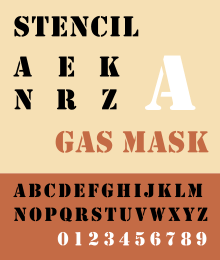Stencil (typeface)
 | |
| Category | Serif |
|---|---|
| Classification | Display |
| Designer(s) | R. Hunter Middleton, Gerry Powell |
| Foundry | Ludlow Typograph, American Type Founders |
| Date released | 1937 |
| Design based on | Clarendon |
Stencil refers to two typefaces released with in months of each other in 1937. The face created by R. Hunter Middleton for Ludlow was advertised in June, while Gerry Powell's version for American Type Founders appeared one month later. Both fonts consist of only capital letters with rounded edges and thick main strokes, much like a Clarendon typeface, except with breaks in the face to give it the appearance of the stenciled alphabets used on boxes and crates.[1] Powell's exploration of Stencil became very popular over time and is still used today.
Digital Copies
Stencil has been copied by many digital producers, including Linotype GmbH, Adobe, URW++. As the A.T.F. version is heavier, it is often called Stencil Bold when copied.
In 1997, Alexei Chekulaev made a Cyrillic version of Stencil Bold, called Stencil Cyrillic Regular.
In Rookledge's Classic International Typefinder,[2] the entry Stencil Bold shows the existence of a lowercase letters in the font that are unavailable from either actual type foundries or the producers of digital type.
Usage
Stencil is a common font for army-themed displays, including The A-Team, Private Benjamin and M*A*S*H television series.
It is used for the credits on card labels on the crates of the Woodland Animations for the BBC Children's programme Bertha.
It is also used as the logotype for Disney's TV show, Recess.
The typeface was used to render the names of the characters in the Incredible Crash Dummies action figure line.
Stencil is also used in the logo for The Home Depot and Réno-Dépôt.
It is also used in the logo for the talk show, Jerry Springer
References
- ↑ MacGrew, Mac, American Metal Typefaces of the Twentieth Century Oak Knoll Books, New Castle Delaware, 1993, ISBN 0-938768-34-4, pp. 292-293.
- ↑ Perfect, Christopher, Gordon Rookledge, Phil Baines, Rookledge's Classic International Typefinder, Lawrence King Publishing, London, 2004, ISBN 978-1-85669-406-3, p. 575.